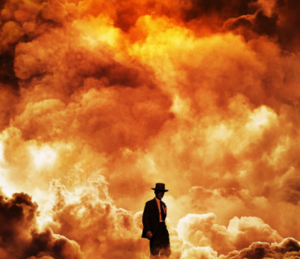Prominent Physicist J. Robert Oppenheimer and His Connection to Bhagavad Gita
In the annals of history, one name that shines brightly is that of J. Robert Oppenheimer, an influential American physicist who played a pivotal role in the development of the atomic bomb during World War II.1
His remarkable achievements in science and technology are widely acknowledged, but there is an intriguing aspect of his life that is often overshadowed – his profound connection to the Bhagavad Gita.

Table of Contents
Why Oppenheimer Quoted Bhagavad Gita
The infamous line by Oppenheimer, “Now I am become Death, the destroyer of worlds,” finds its origins in the Bhagavad Gita, an ancient Hindu scripture. This profound verse comes from Chapter 11, Verse 32 of the Gita, where Lord Krishna, the charioteer and guide of Arjuna, reveals his divine form during the Kurukshetra War.
Emphasizing the Cyclical Nature of Creation and Destruction
The verse from the Gita emphasizes the cyclical nature of creation and destruction, highlighting the eternal force of time that governs these processes. It delves deep into the philosophical aspects of existence, shedding light on the transient nature of the universe.
Oppenheimer’s Connection to the Bhagavad Gita
J. Robert Oppenheimer, the renowned physicist, famously quoted the same line during the Trinity test site after the successful development of the atomic bomb. This quote garnered significant attention, especially after its portrayal in a film.
A Reflection of Mixed Emotions
Oppenheimer later explained that the quote reflected his mixed emotions at the time. On one hand, he felt victorious for achieving a momentous scientific breakthrough, but on the other, he was acutely aware of the devastating power the atomic bomb possessed. The verse from the Gita resonated with his conflicting feelings about the implications of his work.
Cillian Murphy, who portrayed J. Robert Oppenheimer in the film, also uttered the same verse, aiming to capture the essence of the original emotion experienced by Oppenheimer during that pivotal moment. The quote became an integral part of the movie, signifying the ethical dilemmas surrounding the development and use of nuclear weapons.
This single quote has transcended time and has become an iconic expression of the impact of the atomic age on mankind. It symbolizes the tremendous ethical challenges and moral dilemmas associated with the development and use of nuclear weapons.
The Bhagavad Gita Citation After the Trinity Test
On that momentous day of July 16, 1945, the world witnessed the Trinity test, which marked the successful detonation of the atomic bomb in New Mexico. Amidst the jubilation and relief of the successful testing, J. Robert Oppenheimer found solace and resonance in the verses of the Bhagavad Gita.
Cillian Murphy: Embodying the Role of Oppenheimer
Bringing history to life on the silver screen requires exceptional talent and dedication. Cillian Murphy, the brilliant Irish actor, took on the challenge of portraying J. Robert Oppenheimer in a biopic. Immersing himself in the character, Murphy also followed in Oppenheimer’s footsteps by citing a verse from the Bhagavad Gita.

Controversies and Backlash: Exploring Diverse Perspectives
As with any notable event that intertwines with religion and scientific advancements, the citation of the Bhagavad Gita by J. Robert Oppenheimer and its portrayal in the biopic stirred up various controversies and received both support and backlash from different corners of society.
The Bhagavad Gita, often referred to as the Gita, is a sacred Hindu scripture that holds profound wisdom and spiritual insights. Its verses encompass a wide range of teachings, covering duty, righteousness, and the path to self-realization. J. Robert Oppenheimer, a man of great intellect and depth, was deeply drawn to the philosophical and ethical aspects of the Gita.
Controversy and Scandal Surrounding Oppenheimer and Tatlock: An In-Depth Analysis
The inclusion of a Bhagavad Gita reference in the ‘Oppenheimer’ film’s sex scene has triggered significant outrage, as viewers express their displeasure and demand its removal from the movie.
A film by Christopher Nolan. #Oppenheimer is in theaters 7 21 23. pic.twitter.com/rK3LZPD33h
— Oppenheimer (@OppenheimerFilm) May 5, 2023
The Oppenheimer-Tatlock Affair Unveiled
Within the film’s storyline, we bear witness to Oppenheimer, a man known for his love of reading and proficiency in multiple languages, reciting verses from the Bhagavad Gita during an intimate scene with Tatlock, with whom he had an affair.
Oppenheimer, an intellectual with diverse interests, kept a copy of the Bhagavad Gita on his bookshelf, showcasing his inclination towards philosophical and spiritual pursuits.

At Tatlock’s request, he graciously translated a passage from the original Sanskrit, reflecting the depth of their connection and his willingness to share his knowledge. However, this intimate scene featuring Oppenheimer reciting verses from the holy Hindu scripture has triggered offense and discomfort among many viewers.
Escalating Controversy: The Indian Government’s Response
The controversy surrounding this particular scene has escalated to the point where Uday Mahurkar, the Govt. of India Information Commissioner, felt compelled to take action.
Mahurkar penned a letter to the film’s director, Christopher Nolan, expressing his concern and labeling the scene as a “disturbing attack on Hinduism.” In the letter, he urged the removal of this content from all worldwide screenings of the movie.
The outrage stems from the depiction of a sacred text within the context of an intimate scene, which many feel is disrespectful and insensitive to the religious sentiments of Hindus. As a result, calls for the removal of this scene have grown stronger.
Also Read: Is Axell Hodges Dead or Alive? Motocross Competitor Death News
Unveiling the Bhagavad Gita: An Ancient Epic Recited Amidst the Atomic Bomb
In July 1945, merely two days prior to the momentous explosion of the first atomic bomb in the New Mexico desert, a profound moment took place. Robert Oppenheimer, the eminent theoretical physicist, found solace in the verses of the Bhagavad Gita, also known as The Lord’s Song.
Years before, while serving as a teacher in Berkeley, Oppenheimer had delved into Sanskrit, the ancient Indian language, and had the fortune of encountering the enlightening scriptures of the Gita.
This revered text, aged over 2,000 years, stands as an integral part of the Mahabharata, one of Hinduism’s most esteemed epics. Remarkably, this epic poem comprises a staggering 700 verses, making it the longest of its kind in the world.
As the hours ticked away, leading up to an event that would irreversibly alter the course of history, the man often referred to as the “father of the atomic bomb” sought refuge in a specific stanza that he himself had translated from the depths of Sanskrit:
The Bhagavad Gita: An Ancient Indian Treasure
The Bhagavad Gita, a timeless treasure of ancient Indian wisdom, holds profound insights into the human condition, morality, and the paths to righteousness. This sacred scripture, nestled within the vast Mahabharata, emerges as a spiritual guide, transcending time and culture.

Robert Oppenheimer: A Multifaceted Genius
Robert Oppenheimer, renowned for his groundbreaking contributions to theoretical physics, emerged as a multifaceted genius with a deep fascination for languages and culture. During his tenure as an educator in Berkeley, Oppenheimer’s encounter with Sanskrit led him to discover the profound teachings of the Bhagavad Gita.
The Lord’s Song: A Recitation Amidst Tension
As the world approached a defining moment in history – the detonation of the first atomic bomb – Oppenheimer sought refuge in the words of the Bhagavad Gita. The verses, spoken in the ancient language of Sanskrit, resonated with the physicist, offering him a sense of calm amidst the mounting tension.
Having studied Sanskrit with great ardor, Oppenheimer undertook the task of translating a verse from the Bhagavad Gita. In those moments of immense pressure and uncertainty, his translation provided him with a connection to the profound wisdom of the ancient text.
Oppenheimer’s recitation of the Bhagavad Gita before the atomic bomb’s detonation echoes through history as a poignant moment of introspection. This convergence of science and spirituality reminds us of the complex relationship between human intellect and the profound mysteries of existence.

FAQ’S
1. What is the connection between J. Robert Oppenheimer and the Bhagavad Gita?
Ans: J. Robert Oppenheimer, the renowned physicist and one of the key figures in the development of the atomic bomb during World War II, was deeply influenced by the Bhagavad Gita, an ancient Hindu scripture. He became interested in the teachings of the Bhagavad Gita during his time as a student at the University of Göttingen in Germany, where he encountered Indian philosophy and culture.
2. How did the Bhagavad Gita influence Oppenheimer’s work?
Ans: The Bhagavad Gita’s influence on Oppenheimer was profound, especially during the period when he was leading the Manhattan Project, the top-secret research program that produced the first atomic bomb. The scripture’s teachings on duty, responsibility, and the moral implications of one’s actions deeply resonated with Oppenheimer. He often cited passages from the Bhagavad Gita and drew inspiration from its philosophical insights in shaping his perspectives on science, power, and the consequences of his involvement in the development of the atomic bomb.
3. Did Oppenheimer face controversy for using the Bhagavad Gita as a source?
Ans: Yes, Oppenheimer’s use of the Bhagavad Gita as a source of inspiration and guidance for his work on the atomic bomb did attract controversy. Some critics questioned the appropriateness of a scientist relying on a religious and philosophical text to justify the creation of such a devastating weapon. Oppenheimer’s references to the Bhagavad Gita were sometimes misinterpreted and led to concerns about the intertwining of science and spirituality in matters of global significance.
4. Was Oppenheimer’s connection to the Bhagavad Gita significant beyond his work on the atomic bomb?
Ans: Absolutely. Oppenheimer’s connection to the Bhagavad Gita extended far beyond his role in the development of the atomic bomb. He continued to study Indian philosophy and culture, and his interest in the teachings of the Bhagavad Gita remained a significant aspect of his intellectual and personal life. After the war, he became a vocal advocate for international control of nuclear weapons and emphasized the importance of ethical considerations in the use of scientific knowledge.
5. How did Oppenheimer’s view of the Bhagavad Gita differ from traditional interpretations?
Ans: Oppenheimer’s interpretation of the Bhagavad Gita was distinct from traditional religious or philosophical readings. While he appreciated the spiritual aspects of the text, he primarily focused on the Gita’s message of duty, righteousness, and the challenges of decision-making in the face of immense power. Oppenheimer saw the Gita as a profound exploration of the human condition and the complexities of grappling with moral choices, which he found relevant not only to his scientific pursuits but also to broader societal concerns.
Read More: Rey Mysterio (WWE): False Death News Gone Viral, What Happened To Him?




